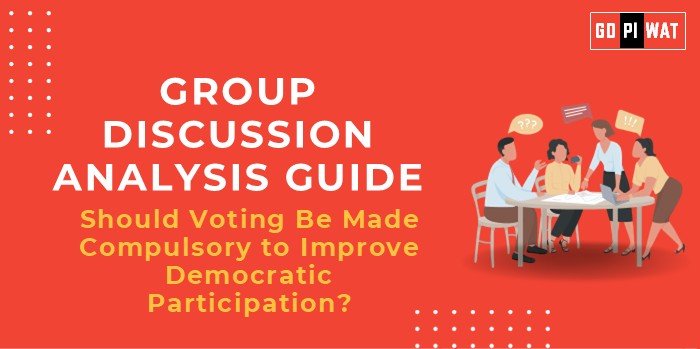📋 Group Discussion Analysis Guide
🌟 Topic: Should Voting Be Made Compulsory to Improve Democratic Participation?
🌐 Introduction
📖 Opening Context
“With voter turnout varying significantly across the globe, the debate over mandatory voting as a tool to enhance democratic engagement continues to gain traction.”
🧐 Topic Background
While democracies like France witnessed 73.7% turnout in the 2022 presidential elections, others faced significant voter apathy. Some argue compulsory voting ensures broader participation, while critics question its practicality and ethical implications.
📊 Quick Facts & Key Statistics
- 🌍 Global Voting Turnout (2022): Turnout varied, with countries like France achieving 73.7% in presidential elections.
- 🗳️ Countries with Compulsory Voting: 21 nations mandate voting; only 10 enforce it actively (January 2023).
- 🇮🇳 Indian Voter Turnout (2019): 67.4%, the highest in the country’s history.
- 👩🎓 Youth Participation (2019): 84 million first-time voters aged 18-19 were eligible to vote.
- 💰 Cost of Indian Elections (2019): Over $7 billion, making it one of the most expensive elections globally.
🔑 Stakeholders and Their Roles
- 🏛️ Government: Creates voting policies and ensures electoral fairness.
- 🗳️ Election Commission: Facilitates voter registration and awareness programs.
- 🧑🤝🧑 Citizens: Fulfill their civic responsibility by voting.
- 🏫 Educational Institutions: Promote civic engagement through awareness campaigns.
- 📢 NGOs and Advocacy Groups: Drive initiatives to increase voter turnout.
🏆 Achievements and Challenges
🎯 Achievements
- ✅ Improved Participation in Enforcing Countries: Nations like Australia maintain ~90% turnout.
- ✅ Youth Engagement Potential: India’s 84 million first-time voters in 2019 underline the untapped power of youth participation.
- ✅ Economic Relevance: High turnout ensures policies represent broader interests, impacting economic and social sectors.
⚠️ Challenges
- 🚧 Enforcement Barriers: Logistical challenges in countries with vast electorates like India.
- 🚧 Ethical Concerns: Mandating voting may infringe on personal freedoms.
- 🚧 Uninformed Choices: Compelled participation could lead to hasty or uninformed voting.
🌍 Global Comparisons
- 🇧🇪 Belgium: Fines for non-compliance ensure turnout consistently exceeds 85%.
- 🇨🇭 Switzerland: Voluntary voting sees turnout around 50%, reflecting genuine interest but lower engagement.
📖 Case Studies
- 🇮🇳 India: Gujarat’s 2009 attempt to introduce compulsory voting in local bodies faced resistance due to logistical and ethical concerns.
✨ Effective Discussion Approaches
💡 Opening Approaches
- 📊 Statistical Insight: “France saw 73.7% turnout in 2022, but global participation remains uneven. Can mandatory voting be a solution?”
- ❓ Ethical Question: “Does enforcing voting undermine democratic freedom?”
- 📚 Case Study Reference: “Belgium’s compulsory voting system achieves 85%+ turnout but raises questions about voter autonomy.”
🔄 Counter-Argument Handling
- 🎯 Highlight the potential societal benefits of inclusive participation.
- 📊 Address concerns with data-driven solutions like voter education campaigns.
- 🛠️ Propose phased implementation and pilot programs.
🔎 Strategic Analysis of Strengths & Weaknesses
- 💪 Strengths: Broader participation, reduced policy polarization, increased accountability.
- ⚠️ Weaknesses: Ethical dilemmas, risk of uninformed voting, enforcement challenges.
- 🚀 Opportunities: Leverage youth engagement, use technology for accessibility, civic education.
- 🛑 Threats: Resistance from stakeholders, logistical complexities in diverse democracies.
📝 Structured Arguments for Discussion
- 🗳️ Supporting Stance: “Compulsory voting ensures representation across all demographics, critical for a thriving democracy.”
- ❌ Opposing Stance: “Enforcing voting infringes on personal freedoms and may compromise electoral integrity.”
- ⚖️ Balanced Perspective: “Mandatory voting can enhance participation if implemented with safeguards respecting individual rights.”
📚 Connecting with B-School Applications
- 📘 Real-World Applications: Link voting behavior to public policy and governance models. Explore case studies of youth and technology in electoral processes.
- ❓ Sample Interview Questions:
- “What are the ethical implications of compulsory voting in democracies?”
- “How can youth engagement reshape electoral outcomes in countries like India?”
- 🎓 Insights for Students:
- Analyze the socio-economic impacts of voter turnout on policy decisions.
- Explore innovations in voting systems, like digital and blockchain voting.


